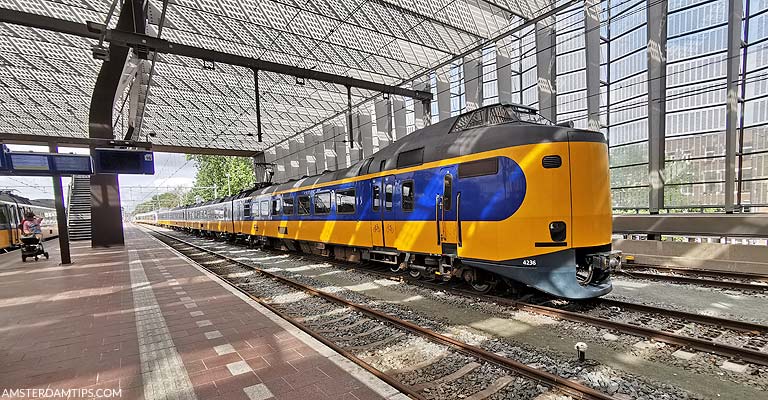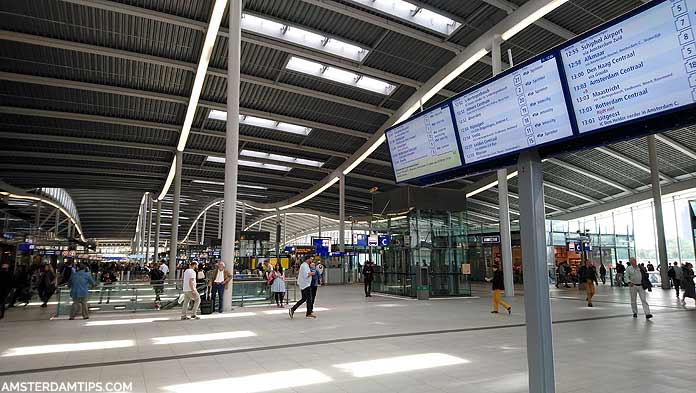
The railway network in the Netherlands is mainly operated by the state-owned company NS, Nederlandse Spoorwegen. With a track length of almost 3,200 km covering some 401 stations, there are up to 750,000 passengers normally using the train every day.
Here are 10 tips and facts about the rail transport network in the Netherlands
1. Tickets guide – Want to know the ins and outs for buying train tickets in the Netherlands? Then get up to speed by reading our complete guide How To Buy Dutch Train Tickets
2. Rail travel from Amsterdam – You can easily reach all the major cities in the Netherlands from Amsterdam Central Station.
Journey times from Amsterdam are as follows: Schiphol Airport (15 mins), Utrecht (30 mins), Den Haag (50 mins), Rotterdam (40-60 mins), Breda (1h 10mins), Eindhoven (1h 20mins), Groningen (2h 10mins, 1 change), Maastricht (2h 30mins) and Vlissingen (up to 2h 50mins).
3. Netherlands rail network map – You will find a handy network map displayed at station platforms. For reference, we show part of the rail system map below which includes the main Randstad region of the country.

We have highlighted the main stations (Amsterdam Central, Schiphol Airport, Den Haag Central, Leiden Central, Rotterdam Central, Utrecht Central and Eindhoven Central) in green. With its geographic central position, you can see that Utrecht is effectively the main domestic rail hub of the country.
Note that a few minor regional train services in the Netherlands are operated by the likes of Arriva, Blauwnet, Breng, Connexxion (Valleilijn) and Keolis.
4. Amsterdam stations – It’s not only Amsterdam Central – there are actually 11 Amsterdam stations in total, some of which are handy for visitors. In the coming years Amsterdam Zuid station in the south of the city will become a major transportation point.
For a visual overview please check out our Amsterdam rail network map
5. The longest Dutch train trip – As you probably know the Netherlands happens to be quite a compact country.
The longest possible journey (timewise, including connections) you can make on the Dutch rail network is from Stavoren (in Friesland, a province in the north-east) to either Vlissingen (in the south-west) or Kerkrade Centrum (south, near Maastricht) which are both timetabled to take just over 6 hours!

6. Delays – Dutch trains are on the whole relatively punctual with 91.6% (2022) of train services labelled “on time” – which means a delay of less than 5 minutes. If your train is delayed more than 30 minutes you can request a partial refund though you will need a Dutch bank account.
The NS website shows in real-time if there are any current line problems (storingen) in map form here. The site also includes timetable information and prices for journeys.
Problems can occur with points/signals/overhead lines during severe winter weather, causing knock-on delays and cancellations – especially around Utrecht.
In any potential adverse winter weather, NS moves to a specially restricted winter timetable (winterdienstregeling).
7. Maintenance – Be aware that routine maintenance (werk aan het spoor) is often done at weekends which can cause delays. This generally means reduced frequency of service, needing to travel via an alternative route or having to use a replacement bus. This information is highlighted on posters at stations and online here.
8. Trains and windmills – NS has an agreement with power company Eneco to provide electricity generated by wind power to run its train services. It should be noted that the electricity still comes from the Dutch national grid rather than a closed system.

For an overview of Dutch trains, see our train types in the Netherlands. Many Intercity services offer free onboard WiFi.
9. High-speed track – The Netherlands has a high speed rail track. The HSL-Zuid (Hogesnelheidslijn Zuid, or High Speed Line South) is 125km of line running from just after Schiphol airport to Rotterdam and then onto the Dutch/Belgian border towards Antwerp.
This track is used by the high speed Amsterdam-Brussels-Paris Eurostar (formerly Thalys) train, the London-Amsterdam Eurostar and the Intercity Brussels service.
The track also branches off to Breda which is used by the domestic Amsterdam-Schiphol Airport-Rotterdam-Breda Intercity Direct service.
10. Train travel information – You can check Dutch rail timetables at the ns.nl website or using the NS app.
At each station, you can still find timetables on large yellow printed boards.

There are also electronic overhead boards which tells you the time and destination of the next train plus the main stopping stations. It will inform of any delays (vertraging) in 5 minute increments or if there is a service cancellation (Rijdt niet).
If you have any questions about your trip just ask one of the NS staff members at the station; unmanned stations have help points where you can talk directly to a member of staff.
The NS is also very active on X/Twitter (@NS_online) where passengers can get quick responses to queries. Whilst most messages are in Dutch they are happy to respond in English.
This article was originally published in 2010 and has been regularly updated. Last update 22 December 2023.
Links on AmsterdamTips.com may pay us an affiliate commission.



